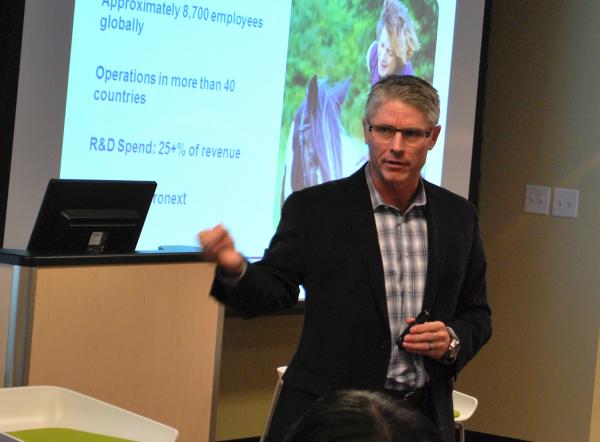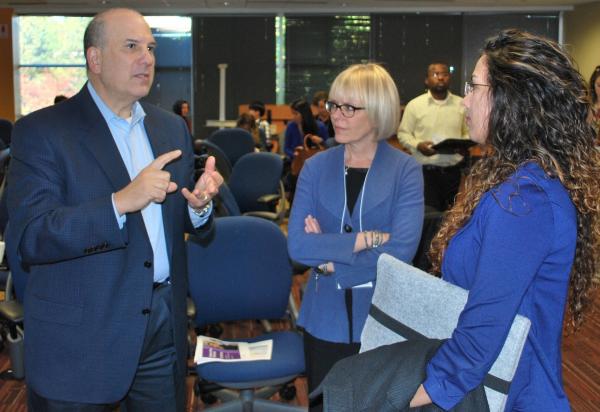If there was a recurring theme at the first UCB-Georgia Tech Day, it was this bit of common sense: You rarely end up where you start in a career.
That essential piece of career wisdom kept coming up during the November 7th event, when about 70 students from the Georgia Institute of Technology got an insider’s view of a global biopharmaceutical company at the North America Operations headquarters of UCB in Smyrna.
“You really don’t wind up where you first started,” says Bruce Lavin, vice president of Medical Affairs for UCB, North America. “And that’s a good thing.”
The experience of his UCB colleague, Deb Hogerman, serves as a fitting example. Thirty years ago, Hogerman never could have imagined that she would become the North America vice president for Regulatory Affairs for a major pharmaceutical company.
“I was schlepping around vats of nutrient media, growing E. coli for vaccine research, and I remember thinking, ‘I went to college for this?’ I mean, it’s an important job, but it’s not what I wanted to do with my career,” Hogerman tells an audience of Georgia Tech students. “When I got into this industry 30 years ago, ‘regulatory affairs’ wasn’t even considered a career path. But it has grown by leaps and bounds since then.”
Regulatory Affairs was just one of four specific focus sessions that students were able to take advantage of at UCB-Georgia Tech Day. Lavin led the session on ‘medical affairs,’ and there were also informative sessions focused on ‘supply chain,’ as well as ‘market access and pricing.’ There was also a session, delivered live from the UK by Neil Weir, UCB’s senior vice president for research, on drug development, and a panel discussion featuring a group of UCB executives. The idea was to give Georgia Tech students an unprecedented snapshot of an industry setting.
“We’ve never done anything like this before,” says Cynthia Sundell, director of life science industry collaborations for the Parker H. Petit Institute for Bioengineering and Bioscience at Tech. “It’s an opportunity to shed some light on the inner workings of a pharmaceutical company and perhaps provide some guidance in terms of potential careers in the industry. Our students are the biotech workforce of the future. They’re the main reason companies come to us.”
The wide-angled approach played well with the students who attended. According to Tom Bongiorno, who is pursuing a Ph.D. in bioengineering, “Georgia Tech seminars often give students the opportunity to learn about one particular aspect of the pharmaceutical industry, but the UCB visit enabled us to hear a bit about each aspect of the pipeline, from drug discovery to regulatory clearance and marketing, in one day.”
UCB-Georgia Tech Day was the result of a concentrated effort to bring the two entities closer together. Jeff Wren, UCB’s president of the North America Region, has made it clear that he’d like to build a strong relationship with Georgia Tech.
“We’re exploring collaborative research options and thinking of other ways to work closely with Georgia Tech,” Wren says. Plans are in the works, for example, to develop an internship program at UCB, which does about $4.2 billion in annual sales globally (3.4 billion euros), impacting the lives of more than 700,000 patients. “We prefer to think of our success in terms of the number of patients we serve, and we know every single one of their names.”
UCB has carved out a significant niche in the industry, serving patients by developing and marketing therapeutics in two main focus areas – central nervous system and immunology. The company, which operates under the banner, “Inspired by patients. Driven by science,” also spends more of its revenues on research and development, on a percentage basis, than almost every other pharmaceutical company – 25 to 27 percent, versus an industry average of about 17 percent.
“Hardly any other pharmaceutical company in the world invests more in research and development than UCB does,” Wren says. “One of our primary roles as a pharmaceutical company is delivering phenomenal products to patients, and we can’t do that if we invest any less. So that’s where we spend our time and effort.”
Which means as the company transforms – and it will, Wren says – the career opportunities in areas requiring advanced degrees will evolve also.
“I think the opportunities will be endless in the pharmaceutical industry as we move forward,” Lavin says. “Here we are, a biopharma organization responsible for developing healthcare strategies for patients, based on their unmet needs. How do we respond to those needs? How do we become more innovative? How do we offer better options and improve healthcare? How do we understand how to marry new technology with clinical science? I think the answers are in the students here today.”
Media Contact
Jerry Grillo
Communications Officer II
Parker H. Petit Institute for
Bioengineering and Bioscience
Keywords
Latest BME News
Jo honored for his impact on science and mentorship
The department rises to the top in biomedical engineering programs for undergraduate education.
Commercialization program in Coulter BME announces project teams who will receive support to get their research to market.
Courses in the Wallace H. Coulter Department of Biomedical Engineering are being reformatted to incorporate AI and machine learning so students are prepared for a data-driven biotech sector.
Influenced by her mother's journey in engineering, Sriya Surapaneni hopes to inspire other young women in the field.
Coulter BME Professor Earns Tenure, Eyes Future of Innovation in Health and Medicine
The grant will fund the development of cutting-edge technology that could detect colorectal cancer through a simple breath test
The surgical support device landed Coulter BME its 4th consecutive win for the College of Engineering competition.









